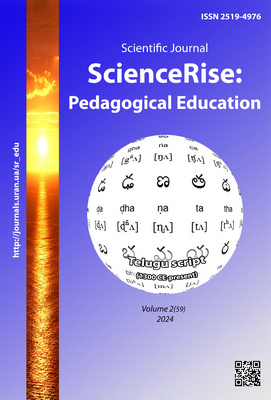The problems of training future teachers of vocational education in the context of post-war economic recovery in Ukraine
DOI:
https://doi.org/10.15587/2519-4984.2024.304927Keywords:
Post-war recovery, vocational education, entrepreneurial competence, competence approach, entrepreneurship, self-employmentAbstract
The research analyzed the key issues of preparing future vocational education teachers for the economic recovery of Ukraine, particularly emphasizing the relevance and necessity of ensuring the economic component of their pedagogical training for the further development of entrepreneurial competence of students in vocational education, which will meet the state's needs during the post-war period in qualified specialists and workers. In the process of scientific research, a set of problems of preparing future vocational education teachers for professional activities in the context of post-war recovery of Ukraine was identified, particularly emphasizing the need for systematic updating of the content of pedagogical training taking into account the socio-economic factors that influence the labor market and determine the content of economic components of educational programs in vocational education. The research utilized methods such as analysis of scientific-pedagogical and socio-economic literature, periodicals, monographs; study of state standards, legislation in the field of education, qualification frameworks, concepts of competency-based approach, strategies for post-war recovery, etc., systematization of research results; interviews with specialists from the Ministry of Education, teachers in vocational education, educators and masters; pedagogical observations, and more. The author identified and justified the relevance of a number of key issues in preparing future teachers in preliminary higher and vocational education considering the economic component of pedagogical training, and also planned perspectives for further research on the readiness of future teachers to carry out their professional activities at the sufficient level, taking into account the modern requirements of the labor market for qualified specialists and workers, as well as the socio-economic factors in the country during the period of post-war recovery
References
- Andrushchenko, V. P., Bondar, V. I. (2010). Modernizatsiia pedahohichnoi osvity vidpovidno do vyklykiv XXI stolittia. Naukovyi visnyk Mykolaivskoho derzhavnoho universytetu imeni VO Sukhomlynskoho. Seriia: Pedahohichni nauky, 28, 12–20.
- Ohiienko, O. I. (2013). Formuvannia hotovnosti do innovatsiinoi diialnosti yak vazhlyva skladova profesiinoi pidhotovky maibutnoho vchytelia. Pedahohichni nauky: teoriia, istoriia, innovatsiini tekhnolohii, 7 (33), 54–162.
- Nychkalo, N. H. (2004). Rynok pratsi i problemy modernizatsii pidhotovky kvalifikovanykh robitnykiv. Profesiino-tekhnichna osvita, 1, 4–12.
- Sysoieva, S. O., Reheilo, I. Yu. (2016). Zmist pidhotovky doktoriv filosofii u haluzi osvity v universytetakh SShA. Pedahohichnyi protses: teoriia i praktyka, 2, 86–93.
- Yezhova O. O. Sutnist orhanizatsiino-pedahohichnykh umov pedahohichnoho protsesu. Naukovi zapysky NDU im. M. Hoholia, Psykholoho-pedahohichni nauky. 2014. № 3. S. 39–43.
- Khoruzha, L. L. (2020). The essence of organizational and pedagogical conditions of the pedagogical process. Pedahohichna osvita: teoriia i praktyka. Psykholohiia. Pedahohika, 33, 8–16.
- Espinosa, M. P. P., Fernandez, I. M. S., Martinez, J. G., Cartagena, F. C. (2020). Education for entrepreneurship in Secondary Education: teachers’ opinions about the current state and future possibilities in European contexts. Bordon-Revista De Pedagogia, 72 (2), 153–172.
- Lv, Y., Chen, Y., Sha, Y., Wang, J., An, L., Chen, T., Huang, X. et al. (2021). How Entrepreneurship Education at Universities Influences Entrepreneurial Intention: Mediating Effect Based on Entrepreneurial Competence. Frontiers in Psychology, 12. https://doi.org/10.3389/fpsyg.2021.655868
- Boiko, A. M., Demianenko, N. M. (2014). Pedahohichna innovatyka: vid terminolohichnoho obgruntuvannia do kryteriiv uprovadzhennia. Problemy osvity, 78 (1), 19–26.
- Dubaseniuk, O. A.; Dubaseniuk, O. A. (Red.) (2014). Innovatsii v suchasnii osviti. Innovatsii v osviti: intehratsiia nauky i praktyky: zbirnyk naukovo-metodychnykh prats. Zhytomyr: Vyd-vo ZhDU im. I. Franka, 12–28.
- Honcharenko, S. U., Taranenko, I. M. (2014). Profesiina kompetentnist maibutnoho pedahoha yak aktualna problema vyshchoi osvity. Redaktsiina kolehiia, 211.
Downloads
Published
How to Cite
Issue
Section
License
Copyright (c) 2024 Nataliia Tykhonova

This work is licensed under a Creative Commons Attribution 4.0 International License.
Our journal abides by the Creative Commons CC BY copyright rights and permissions for open access journals.
Authors, who are published in this journal, agree to the following conditions:
1. The authors reserve the right to authorship of the work and pass the first publication right of this work to the journal under the terms of a Creative Commons CC BY, which allows others to freely distribute the published research with the obligatory reference to the authors of the original work and the first publication of the work in this journal.
2. The authors have the right to conclude separate supplement agreements that relate to non-exclusive work distribution in the form in which it has been published by the journal (for example, to upload the work to the online storage of the journal or publish it as part of a monograph), provided that the reference to the first publication of the work in this journal is included.







